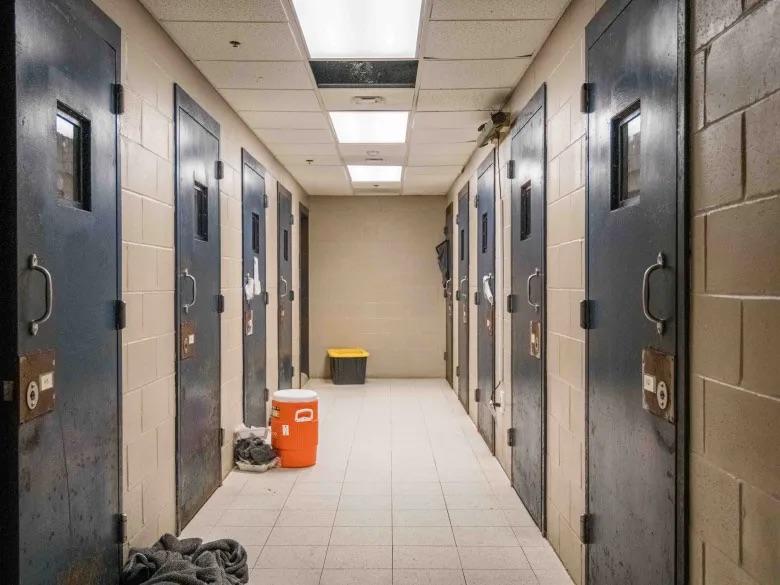
Caption
Three sheriff-elects in Coastal Georgia elevated by voters seeking change, reform in their communities in the 2024 election.
Credit: Courtesy of The Current

Three sheriff-elects in Coastal Georgia elevated by voters seeking change, reform in their communities in the 2024 election.
Jake Shore, The Current
Correction at 12:28 p.m., Nov. 7, 2024: Coleman is not a first-time candidate. He ran for sheriff against Al St. Lawrence in 2004.
Three first-time or non-incumbent candidates for sheriff in Coastal Georgia won these powerful law enforcement posts, as voters chose change and reform in these positions that control jails and solve crimes within county lines.
In Chatham County, Richard Coleman, a Democrat, upset two-term Sheriff John Wilcher, a Republican, in an election centered on issues about burdensome detainee visitation policies and jail conditions.
In McIntosh County, the vacated seat left by Republican Sheriff Stephen Jessup went to Georgia state patrol major, Thornell “T.K.” King, who beat Jessup’s top deputy, Chris Mitchell. King is a Democrat, in a county that went more than 28 points for Donald Trump over Kamala Harris for U.S. president.
In Camden County, James “Kevin” Chaney unseated 12-year incumbent Jim Proctor, as voters sought more accountability and transparency in the embattled sheriff’s department. Chaney was the Republican candidate while Proctor ran as an independent.
The job of sheriff includes running the county jail, caring for detainees and often intervening in rehabilitative programs, as well as serving warrants and protecting the courthouses.
When Coleman, a Georgia police chief and longtime Savannahian, first announced his candidacy in August 2023, political insiders in Chatham County dismissed his run.
Incumbent Wilcher was a rare conservative who enjoyed the support of Republicans and Democrats alike in the county known as a blue dot in a politically conservative part of the state.
Some Democratic members of Savannah City Council openly supported the no-nonsense sheriff’s reelection.
While Coleman originally ran on improving conditions in the jail for both detainees and deputies working there, he added a major plank campaign plank that turned into a wedge issue in the race: in-person visitation.

Chatham County Sheriff badge and logo on Oct. 19, 2023.
An investigation by The Current in spring 2023 found that Chatham, and other jails along the coast, garnered large revenues by charging people in jail fees for talking on the phone, video calls, and text messages, all while prohibiting in-person visitation due to Covid-19. This occurred through contracts the jails had with telecommunications providers.
Between 2021 and 2023, Wilcher’s agency collected nearly $1.3 million in fees from the contracts. The Current’s reporting also found that families struggled to pay the fees to stay in touch with loved ones who were detained and awaiting trial. Wilcher explains the fees as a way to help pay for rehabilitation programs without raising taxes.
The total revenue collected shocked Coleman. He said he heard from multiple Chatham residents about the emotional and financial toll it took to stay in touch with detained family members and not be able to see them in-person.
“A part of the campaign is not (just) your ideas but also hearing from the people you’re going to represent,” Coleman said. “I really sat back and I studied this issue. Then, I knew I was going to take a different position on that.”
The campaign changed as Wilcher’s health deteriorated. He suffered a cardiac arrest in June, remained hospitalized for months and finally returned to office in September. Since then, he remains in a wheelchair and said in a recent interview he works in the office only two days a week.
According to unofficial vote tallies, Coleman won by a wide margin 54.04% to Wilcher’s 45.96%. Coleman collected 73,948 votes while Wilcher received 62,882.
Coleman pledged that come January, when he takes office, he will review jail operations, policies and personnel. He wants to expand street operations and enforcement to assist local law enforcement, as well as stop charging fees for communications between detainees and family members.
McIntosh County had the same top law enforcer since 2009.
So when Sheriff Jessup decided not to run for reelection in 2024, it created an opportunity for new leadership for a position made infamous by news headlines about racial profiling in traffic stops and good-ol-boys networks referenced in the pages of “Praying for Sheetrock.”
King threw his hat in the ring as a Democratic candidate.
The longtime McIntosh resident and Georgia State Patrol major, honored by the state legislature in 2021, pitched increasing trust between law enforcement and McIntosh citizens. Chris Mitchell, who ran as a Republican, said he would prioritize reducing debt the sheriff’s office had accrued while keeping citizens safe through “proactive policing.”
King won with 52.49%, or 3,875 votes, to Mitchell’s 47.51%, or 3,508 votes — as of Wednesday afternoon’s unofficial totals.
King did not respond to a request for comment.
The race for sheriff in Camden County was dominated by concerns over transparency and sky-high costs passed on to taxpayers.
Since mid-2022, The Current has reported on the ballooning issues at the sheriff’s office.
Camden deputies violently beat a detainee, Jarrett Hobbs, in September 2022, but the incident didn’t come to light until February 2023 when lawyers for Hobbs released the video of the beating.
The attack on Hobbs, originally arrested by Camden deputies for speeding and possessing marijuana and ecstasy, was a vivid example of an pattern of abusive behavior among some Camden County Sheriff’s Office deputies. They have also been accused of forcefully pulling over motorists and violently beating detainees in the jail. The misbehavior resulted in indictments for five deputies since 2022, hundreds of thousands of dollars paid out in lawsuit settlements, and higher insurance rates after the county’s insurer dropped coverage for the government.
The Hobbs case and others involving Camden deputies are still under scrutiny by federal prosecutors.
Unhappy with the status quo, Chaney decided to run against Proctor, his former boss. Chaney said he ran on a platform of increasing transparency into the office, reducing costly incidents of police misconduct and fixing the broken-down jail. Proctor said he had addressed the issues at the jail and among his workforce.

A newer wing at the Camden County Detention Center on April 11, 2024, in Woodbine, GA. During the summer, the sheriff stated that the walls “sweat” and prisoners suffer without air conditioning.
Chaney won the election with 15,926 votes, or 63.21%, while Proctor received 9,271 votes, or 36.79%, according to unofficial counts on Wednesday evening.
The biggest change in administration, according to Chaney, will be how he responds to internal problems.
“I can’t stop lawsuits. I can’t stop problems inside the sheriff’s office,” Chaney said. “How do we deal with those mistakes? Now, I say come out to the public, explain it to them, I say, ‘Listen, we made a mistake. This is what happened. This is how we want to be. Here’s the steps.’”
Other priorities for Chaney include working with commissioners to fund construction of a new jail, peer support programs to address deputy mental health, and releasing monthly or quarterly transparency reports to the public on use of force, citations and other operations.
This story comes to GPB through a reporting partnership with The Current.